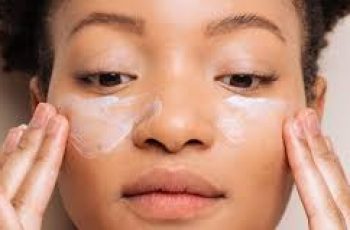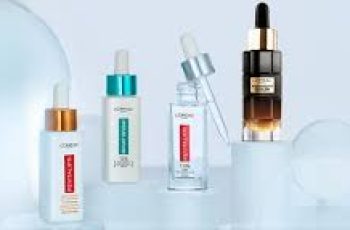Skin Barrier Repair: 7 Tips for Healthier Skin
Balance and patience are the key ingredients to help you achieve a healthy skin barrier.
You might have a damaged skin barrier if your skin is feeling dry, irritated, or super sensitive. But don’t worry! With a little TLC, you can reclaim your healthy glow with a little barrier repair. Here’s the lowdown on how to help your compromised skin reclaim its former glory.
How to repair skin barrier
Your skin barrier (aka epidermis) takes a mighty beating. As the outermost layer of your skin, it faces everything from whipping winds to scorching sun. Stress, excessive drinking, smoking, lack of sleep, or various illnesses can also contribute to skin concerns.
But your skin barrier might also be hurting from your own skin-care routine. It’s me, hi. I’m the problem, it’s me. Overusing too many products with different active ingredients can be a recipe for skin barrier damage. If you’re an overzealous exfoliator or smearing your skin with products containing retinoids or alpha hydroxy acids, you need to pump the breaks.
Here are some tips for rebuilding your skin’s barrier!
1. Eliminate the skin care cocktail
Some active ingredients in your skin products help to exfoliate your skin, while others boost hydration. However, combining too many active ingredients at the same time can do more harm than good. Take a closer look at the active ingredients in your skin products and eliminate anything that contains retinoids (usually in the form of retinol) or AHAs (alpha hydroxy acids). Think of this as an elimination diet for your skin.
2. Chill out on the chemical exfoliation
Another way to immediately stop irritating your skin is to ease up on the exfoliation. Start by avoiding harsh chemical exfoliants. Retinol, for instance, can help prevent clogged pores and boost collagen production, but it can also be too much of a good thing if used too often or in combination with AHAs. Also, avoid exfoliating cleansers with glycolic acid or salicylic acid.
3. Stop scrubbing so hard
While chilling out on the chemical exfoliation, it’s a good idea to ease up on the physical exfoliation. Instead of treating your skin like old wooden furniture that needs power sanding, treat it like a newborn. When cleaning your skin, opt for lukewarm water over hot water and reach for a soft washcloth instead of a rough scrub brush.
4. Join the hydration nation
Moisture is your skin’s best friend, so hydrate from the inside out. When it comes to moisture, you want to put it in and lock it in. Fill up that water bottle, pop it on your desk, and take some sips all day!
When in balance, your skin’s natural oils are your skin barrier’s best friend. A lot of popular cleansing products, like drying sulfates, strip away too much of your skin’s natural oil, leaving your skin barrier dried out and damaged. Instead, try a gentle cleanser with glycerin or hydrating ingredients naturally occurring in your skin, like hyaluronic acids or ceramides. Top this off with a very gentle, water-based moisturizer.
5. Your skin reflects your lifestyle
You are what you eat. And what you smoke. And what you worry about.
In other words, strive to find balance in your life when it comes to your diet, your stress levels, and your habits. Your skin barrier will thrive if you have a balanced diet, a mental health regimen, and regular fitness practice.
6. Avoid UV rays
The sun can be a great source of vitamin D, but it can also damage the skin barrier. While you’re finding a new, gentler skin care routine, help your skin barrier by applying a simple and gentle sunscreen product on a daily basis. While you’re at it, don’t be shy about wearing a stylish hat for even more UV protection.
7. Decrease inflammation
Inflammation can cause a number of woes, including damage to your skin barrier. Some skin care products contain anti-inflammatory ingredients like oats, squalane, niacinamide, or tiger grass. It might help to add foods to your diet that decrease inflammation, like fish, nuts, avocados, and olive oil.
What is the fastest way to repair skin barrier?
Don’t expect an overnight rebound when it comes to skin barrier repair and recovery. Consistency and patience are your two greatest allies in building lasting skin resilience. Some experts estimate that a compromised skin barrier can heal at least a month. If the damage is more extensive, your skin can take up to three months to show lasting improvement.
It’s important to note that your skin might look worse before it feels better, as with any natural healing process. Try not to panic. Give your new skin routine some time to work. Swapping products too often can start the skin barrier damage cycle all over again.
How do I know if my skin barrier is damaged?
You can usually spot skin barrier damage through these common symptoms:
dryness
redness
irritation
acne
rosacea
eczema
You might have skin barrier damage if your skin feels extra dry, ashy, or flaky. When applying products, extra sensitivity, stinging, or burning is also a sign that your skin is crying out for help. A little pain might be normal when adjusting to a new product, but stop using that product if the pain lasts.
Takeaway
To boost skin care health, eliminate products with retinoids and AHAs, ease up on chemical and physical exfoliation, make your body a hydration station, and find a lifestyle that promotes both physical and mental health. Protect your skin from UV rays, reduce inflammation, and reach for gentle skin products that will help you balance your natural skin oils.
As you start your new skin care journey, remember to be patient and consistent as your natural glow gradually comes back!
DQH Knowledge drop: In your 20s, your skin cell turnover decreases. (Cell turnover is a key component in keeping your skin youthful.) You know what else slows down? Your collagen production. Starting in your 20s, collagen decreases by about 1 percent per year. Should you want to prevent fine lines and wrinkles, start by eliminating behaviors that contribute to premature aging. “If it’s bad for you, it’s bad for your skin,” says dermatologist Michel Somenek.
“Cigarette smoking reduces blood flow to the skin and causes premature wrinkling and a dull skin texture. Making the repeated pursed motion to inhale can also cause smoker’s lines. Alcohol and recreational drugs are toxins for the skin that damage its cellular structure and DNA,” Somenek tells us. “The faster you eliminate vices while you are young, the better chance your skin and body have to recuperate.” Also, adopting an anti-aging routine in your 20s is key. After all, the best offense is a good defense. We spoke to Somenek and experts Joshua Ross and Audrey Kunin to find out more.
Keep reading for the best anti-aging products for your 20s, according to skincare professionals.
Sunscreen
“We all know that the sun is the number one cause of skin aging and starting the prevention in your 20s is very important,” Ross says. “The majority of your sun damage won’t start to appear until you’re in your 30s, so don’t wait until you see it surface or you’ll be behind the curve. Stay ahead of it with a good-quality zinc-based sunscreen worn daily.”
Farmacy Green Defense Daily Mineral Sunscreen
An invisible sunscreen with SPF 30, plus botanical extracts meant to protect skin with tons of antioxidants. Bonus: It’s clean and fine to use under makeup.
Bareminerals Complexion Rescue™ Tinted Moisturizer Broad Spectrum SPF 30
Although we recommend you use your SPF and moisturizer separately, we also understand moments when you don’t have time or energy for that extra step. For those times, this bareMinerals moisturizer is a great thing to have on hand.
Vitamin C Serum
“A great introduction to anti-aging is to start with a vitamin C serum in your morning skincare routine,” Ross says. “It’s a powerful antioxidant that will neutralize free radicals and brighten the skin.” He adds that it’s a great way to counteract the effects of the sun’s harmful rays, which, as previously mentioned, are among the biggest causes of premature aging.
Drunk Elephant C-Firma™ Vitamin C Day Serum
The Drunk Elephant C-Firma is a lightweight serum that promises to give skin a glow by combining the brightening powers of vitamin C with ferulic acid, l-ascorbic acid, and vitamin E. The included sodium hyaluronate is meant to replace hydration loss, so you shouldn’t have to deal with any irritation.
Sunday Riley C.E.O. Rapid Flash Brightening Serum
This potent serum is jam-packed with vitamin C (15 percent, to be exact), which means it’s a potential superstar at both brightening skin and dousing it in antioxidants.
Peptides
Using peptides on your skin has many benefits, says Somenek. “The skin barrier is what defends the body against pollution, UV rays, bacteria, and toxins. It can be damaged by several everyday factors. Using topical peptides aids in building a stronger barrier,” he says. “Peptides comprise elastic fibers, which are a type of protein. These fibers help to make skin appear taut and firm. Peptides can also help repair damaged skin, relieve inflammation, and even out skin tone. Some peptides can kill acne-causing bacteria that is common in 20-somethings.”
Kunin agrees, saying, “Peptides are an excellent entry point for supporting collagen.” She recommends looking for face and eye treatments that contain these collagen-boosting powerhouses.
Charlotte Tilbury Magic Eye Rescue Cream
This Charlotte Tilbury super-emollient eye cream has a base of coconut oil and shea butter (read: it’s incredibly hydrating). Botanicals plus peptides are meant to help reduce dark circles and boost collagen, respectively.
This creamy moisturizer serves up potent collagen-boosting peptides and pycnogenol, and antioxidant-rich vitamin C. “Instead of sitting on top of the skin, peptides penetrate the outer layer so they go deep. The ‘signals’ they send tell the cells to produce elastin and collagen, which are needed for youthful-looking skin,” explains Somenek.
At-Home Peel Pads
Remember that skin cell turnover fiasco we talked about earlier? One way to help support it is by exfoliating. “Exfoliation is important to help keep skin fresh and luminous,” Kunin says. She recommends using at-home peel pads as an easy and effective way to exfoliate.
“The goal in your 20s is to fight the slowing pace of cell turnover. It is wise to use products that gently exfoliate, yet still remove oil and other impurities. Products that have Alpha Hydroxy Acids (AHA) or Beta Hydroxy Acids (BHA) are a good choice.”
According to Somenek, you should only exfoliate two to three times a week. “People of all ages are guilty of over-exfoliating and that can be too much of a good thing,” he says.
Dermadoctor Kakadu C Intensive Vitamin C Peel Pad
A few swipes of this Derma Doctor powerful peel pad promise to leave your skin glowing and smooth, thanks to the seven (yes, seven) types of chemical exfoliants, including AHA and BHA. It also contains vitamin C via Kakadu plum extract for added brightening and antioxidant protection.
KEY INGREDIENTS Kakadu plum extract is sourced from the Kakadu plum, a fruit grown in northern Australia. It contains vitamin C, which restores the skin’s natural barrier, increases collagen production, and soothes irritation.
Dr. Dennis Gross Skincare Alpha Beta® Universal Daily Peel Pads
These are the gold standard of peel pads, with a cult following and over 900 five-star reviews on Sephora. They’re easy to use and contain a blend of anti-aging exfoliating acids.
Emollient Night Cream
“In your 20s, you need to start upping the hydration in your skincare routine. You may have been cautious of over-moisturizing because of acne in your teens, but as you enter your 20s, your skin transitions and becomes drier,” Ross says. “I recommend an emollient night cream added into your evening skincare regimen.”
“Twenty-somethings need to make sure that they are not using creams that will clog their pores and cause excess oil production,” says Somenek. Opt for non-comedogenic products.
Cerave Skin Renewing Night Cream
One great choice is the CeraVe Skin Renewing Night Cream, which is a non-comedogenic night cream that leaves skin soft and glowy. It combines the moisturizing powers of ceramides and hyaluronic acid.
RoC Retinol Correxion Max Hydration Creme
“The best night cream ingredients contain retinol, benzoyl peroxide, and/or salicylic acid or hyaluronic acid. The goal is to moisturize, yet remove excess oil,” says Somenek. This Roc Retinol Correxion cream fits the bill as it contains both hyaluronic acid and retinol so it promises to moisturize while also being non-comedogenic.



